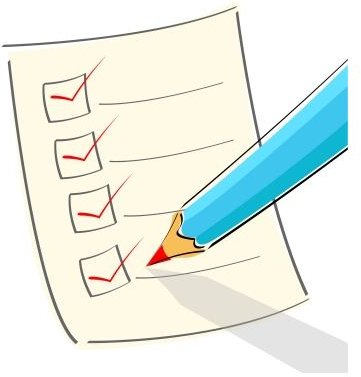An Estate Planning Checklist: What Do You Need To Do?
Decisions of Practicality
While many people consider estate planning something that they should do close to retirement, there are many valid reasons to begin estate planning far earlier. Estate planning involves far more than finances, it also includes making health care decisions, housing decisions and planning for children or disabled family members. It is never too early to have a solid plan in place to deal with these issues (as well as financial ones) well before it is needed. This can also avoid problems arising if there is an accident or sudden illness. Here are some of the things that should be included in an estate plan.
Medical decisions - We are living longer than ever and more people are living healthy lives well into their 70s and 80s. However, not all people will be free of medical issues this long. Having a health care proxy defining exactly what your wishes are can help ease family tensions during difficult times. Accidents can happen that can have a profound effect on a person’s ability to care for themselves. Diseases such as Alzheimer’s can have a serious impact on the ability to live alone and be self-sufficient. Depending on the laws in individual states this may require two documents, a living will and a power of attorney for medical decisions. Other states may only require a health care directive. Either way, this document should be prepared in consultation with spouses/partners and children so that everyone understands your wishes.
Organ donation decisions - Sadly, this is something that all too frequently is overlooked when preparing living wills and other similar documents. The need for organ and tissue donations is very real and always critical. However, families must know of the donor’s wishes or they can provide health care professionals with erroneous information. Those who have designated themselves as an organ donor should include this information in their living will (or health care directive) and should inform their families as well as their physician of their decision.
Allowances for minors and disabled dependents - Minor children must be cared for in the event that parents succumb to an accident or become critically injured. Unfortunately, many families also have other dependents who are unable to care for themselves. Directives in the form of guardianships or an appointment of a custodian may be required by law to care for dependents. These should be prepared early on to avoid any unnecessary lapse in care of minors or those who are unable to care for themselves. Allowances may need to be made for any financial gifts made to minors as well.
Necessary Financial Decisions

Final financial decisions are very difficult to prepare in advance, but it is sensible to create a financial plan early on and modify it as needed. There are numerous things that must be considered when creating the financial side of an estate planning checklist. These include:
Bank accounts - Bank accounts—including savings accounts, checking accounts and certificates of deposit—should be noted in a record book with the name of the financial institution, the address and the account numbers. Additionally, the name(s) that are on the account should be included and if possible, the date opened. As years pass and new accounts are added they should be included in this register. This information can then be used in a will or trust to transfer assets to beneficiaries.
Retirement accounts - Many people have multiple retirement accounts including individual retirement accounts (IRAs) at banks, broker dealers or mutual funds. They may also have pension accounts with their employer and 401(k) or 403(b) plans or other retirement benefit accounts. The records of these should also be recorded along with the name of the beneficiary on each of these accounts. This will help avoid a great deal of confusion.
Real estate - Real estate should be documented including titles or deeds, outstanding mortgages and rental agreements, if they apply. This includes documentation regarding primary residences, vacation homes or investment properties. Having all of the documents in one place will allow those settling an estate to identify assets more readily. Information regarding ownership (individual, joint or corporate) should be included in the information gathered.
Insurance policies - Finally, insurance policies should all be gathered together. This includes life insurance, medical insurance and accident insurance. Additionally, homeowner policies, automobile policies or burial policies should also be collected and put into a single file. This will allow an estate administrator to quickly identify any benefits that need to be claimed by the estate, policies that need to be closed, etc.
Final Plans and Decisions
Each person will have to determine which type of estate planning vehicle works best for their individual needs. This should be done by taking into consideration the beneficiaries, the amount of estate taxes that may be due and other considerations. Some may decide that placing the beneficiaries of certain assets as joint holders is the most beneficial option. Others may decide that a will is the appropriate legal document for their needs while others may find that trusts are the best vehicle for handling their estate.
Arrangements for burial plots, pre-paid funeral expenses and other considerations may be pre-funded or some may feel that setting up a transfer on death registration on a bank account for these purposes is more beneficial. Anyone who is considering a long-term financial asset protection plan that feels that it is too overwhelming is encouraged to discuss individual circumstances with a certified financial planner or an attorney who specializes in estate law.
Resources
Sources:
- Central Intelligence Agency: World Fact Book - Life Expectancy at birth: https://www.cia.gov/library/publications/the-world-factbook/rankorder/2102rank.html
- Nolo - Law for all: 12 Simple Steps to an Estate Plan: A Checklist https://www.nolo.com/legal-encyclopedia/12-simple-steps-estate-plan-29472.html
- Donate the Gift of Life - Organ donation: Will my wishes be carried out https://answers.hrsa.gov/app/answers/detail/a_id/337/session/L3RpbWUvMTMwOTM5Mzg1OC9zaWQvVTlFTjRNeGs%3D
Image credits
- Checklist: via freedigitalphotos.net/digitalart
- Dollars and finance via freedigitalphotos.net/jannoon028
